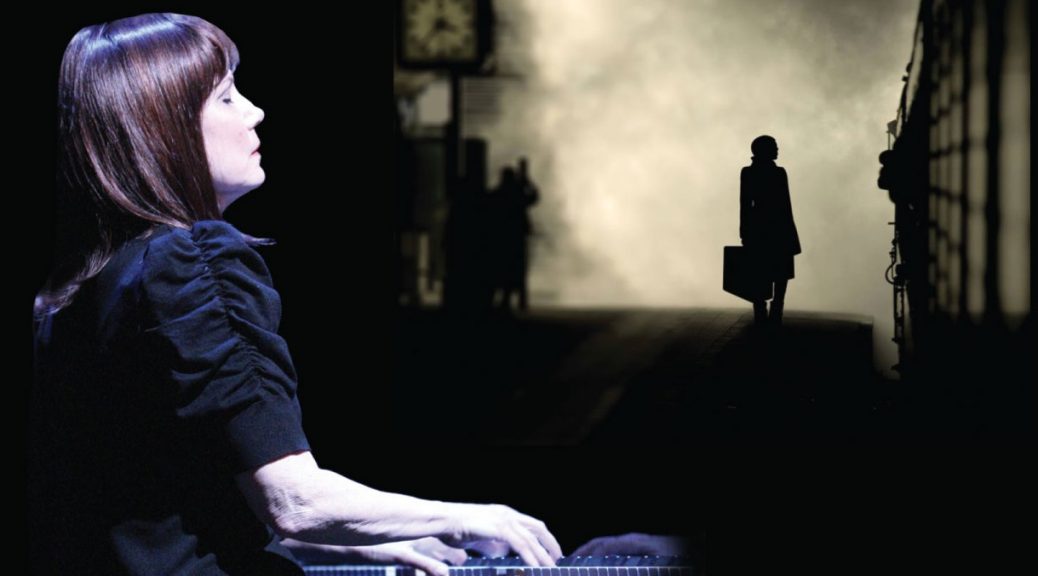
FROM DARKEST TIMES TO BRIGHT LIGHTS
MOUNTAIN VIEW, CA—Explosions! Horror! Melodrama!
Not your average story of a girl learning to play the piano, but there’s all this and more in “The Pianist of Willesden Lane,” a compelling work now showing at the Mountain View Center for the Performing Arts in a four-week production by TheatreWorks Silicon Valley. It all comes from one woman, a stage and a concert grand piano.
“Pianist” features the multi-talented Mona Golabek telling the riveting, heart-warming story of her mother’s struggle to become a concert pianist against all odds. The show is directed by Hershey Felder, and adapted by him from a book by Golabek, “The Children of Willesden Lane.” Felder has sold out houses with a number of different one-man shows profiling great composers.
If you were in danger of overdosing on the prolific Felder, this show is Felder without his presence on stage but with Golabek’s superb pianism.
The structure and staging is the same as many of Felder’s one-man shows – a single narrator (Golabek) playing all roles, between romps at the keyboard. Golabek tells the story of a Jewish, Viennese piano student’s coming of age in the middle of the Second orld War, the Holocaust, the German bombing campaign in England, and beyond.
The student is Golabek’s mother, Lisa Jura, who was rescued from the Nazi horror sweeping Europe by the British movement Kindertransport bringing Jewish children to England. It was a shining bit of humanity as anti-Semitism became deadly in Europe.
The show has staying power; Golabek has performed it since 2012. By her own estimate, she’s given around a thousand performances and published a book now in its 24th printing in half a dozen languages. Her non-profit distributes the book to children worldwide.
As the performance Jan. 19 ended on a high, tear-inducing emotional note, everyone capable rose in a standing ovation.
The “Pianist of Willesden Lane” runs 90 minutes-plus. After a slow start, it moves from an idyllic girlhood in Vienna through the Nazi horrors that swept Europe in the latter half of the 1930s to D-Day in 1945.
In Golabek’s hands, the piano becomes an important character – one that equally portrays the dreams of a young girl, (Grieg); the busy hum of a clothing factory (Bach); the terrible destruction of the London blitz (Rachmaninoff); and the culmination of the girl’s dreams (Grieg again) in England. Lisa Jura escaped the Nazis’ ethnic cleansing of Austria with a Kindertransport ticket.
The ticket had been won in a card game by her father, a tailor whose shop was shut down because he was Jewish. This bit of luck brings the story to its second chapter in England, where Jura was given work in a clothing factory, and through her own pluck and determination, landed in a hostel for refugees that had a piano. The efforts of her housemates to help her train for an audition to the Royal Academy of Music, one of the world’s leading conservatories, is enough to induce a few quiet tears.
The portrayal of the blitz is possibly the most effective I have witnessed.
In the end, Jura found career, love and a new life in America. Her sisters survived the Holocaust, though her parents did not.
One flaw in the show is in the unintelligibility of accents of the various characters. Here and there, it was hard to make out what the piano teacher, the British Kindertransport director and others were saying.
Spotless pianism coupled with a great story – who could ask for more from a couple hours on a Sunday afternoon?
Children old enough to grasp the content should see this. As Golabek says in the program notes: “What all of this is about is: Who’s going to tell the stories when they’re gone, and pass it on?”
Some of Felder’s sets are quite inventive in an expressionistic way. This one is not quite up to that level, but it works. Four huge, gilded picture frames behind the performer and her piano are used effectively to show scenes from the Holocaust, the blitz, and the domestic harmony that the Nazis destroyed.
Running through Feb. 16 at the Mountain View Center for the Performing Arts. “The Pianist of Willesden Lane,” at TheatreWorks Silicon Valley, Mountain View, CA. For info, call (650) 463-1960, or go online: www.theatreworks.org.